|
|
|
Sort Order |
|
|
|
Items / Page
|
|
|
|
|
|
|
| Srl | Item |
| 1 |
ID:
091123
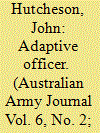

|
|
|
|
|
| Publication |
2009.
|
| Summary/Abstract |
The majority of officers will be working in a multi dimensional and unpredictable operational environment on complex problems that require an integrated inter-agency and/or coalition solution. To assist in developing those solutions officers will need to be more cooperative, compromising and collaborative in order to shape the desired outcome. This desire requires the ability to think critically, communicate effectively, and influence others through persuasive argument. This article seeks to highlight a how Army can develop officers who can think, communicate and influence other non Army people to implement the adaptive Army initiative.
|
|
|
|
|
|
|
|
|
|
|
|
|
|
|
|
| 2 |
ID:
032485
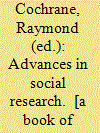

|
|
|
|
|
| Publication |
London, Constable, 1973.
|
| Description |
ix,460p
|
| Series |
Sociology and social welfare services
|
| Standard Number |
0094581908
|
|
|
|
|
|
|
|
|
|
|
|
Copies: C:1/I:0,R:0,Q:0
Circulation
| Accession# | Call# | Current Location | Status | Policy | Location |
| 011956 | 150/COC 011956 | Main | On Shelf | General | |
|
|
|
|
| 3 |
ID:
062073
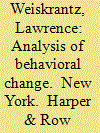

|
|
|
|
|
| Publication |
New York, Harper & Row Publishers, 1968.
|
| Description |
447p.
|
|
|
|
|
|
|
|
|
|
|
|
Copies: C:1/I:0,R:0,Q:0
Circulation
| Accession# | Call# | Current Location | Status | Policy | Location |
| 003604 | 150.1943/WEI 003604 | Main | On Shelf | General | |
|
|
|
|
| 4 |
ID:
090691
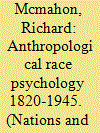

|
|
|
|
|
| Publication |
2009.
|
| Summary/Abstract |
This article examines ethnic stereotypes in biological race classification of Europeans between the 1830s and 1940s as part of political discourse on national identity. Anthropologists linked physical-psychological types to nations and national character stereotypes through 'national races', achieving an often quite enduring international consensus on each race's mentality. The article argues that race mentality narratives were therefore partly dictated by their place within a dynamic interlocking European system. I focus on two key interacting elements that structured this system: the central role of the Germanic-Nordic blond and the geographically uneven process of modernisation. I consider the spatiality of socio-cultural and political factors 'external' to the stereotype system, such as geopolitics and modernisation, but also emphasise that discursive relationships between national stereotypes helped structure the international stereotype system. My conclusion argues for greater consideration of the influence of both scientific and international systemic factors in research on national identity
|
|
|
|
|
|
|
|
|
|
|
|
|
|
|
|
| 5 |
ID:
105232


|
|
|
|
|
| Publication |
2011.
|
| Summary/Abstract |
The application of psychological perspectives to international studies (IS) is an area of growing research. This review provides a brief overview of interdisciplinary scholarship on psychology in IS, with a particular description of its application to examining traumatic stress. Psychological variables and methods can help IS to achieve greater explanatory power. Using a variety of methods such as surveys, simulations, and case studies to investigate psychological constructs in the international context can overcome the limitations of relying on any single approach. Several psychological constructs with potential applicability to understanding traumatic stress in particular are discussed to illustrate the application and limitations of psychological perspectives in IS. With so many theories and methods, psychology offers rich future possibilities for novel ways to examine IS.
|
|
|
|
|
|
|
|
|
|
|
|
|
|
|
|
| 6 |
ID:
040018
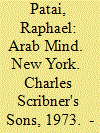

|
|
|
|
|
| Publication |
New York, Charles Scribner's sons, 1973.
|
| Description |
vii, 376p.
|
|
|
|
|
|
|
|
|
|
|
|
Copies: C:1/I:0,R:0,Q:0
Circulation
| Accession# | Call# | Current Location | Status | Policy | Location |
| 013116 | 305.8927/PAT 013116 | Main | On Shelf | General | |
|
|
|
|
| 7 |
ID:
026918
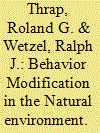

|
|
|
|
|
| Publication |
New York, Academic Press, 1969.
|
| Description |
xiii, 236p.
|
| Standard Number |
126860505
|
|
|
|
|
|
|
|
|
|
|
|
Copies: C:1/I:0,R:0,Q:0
Circulation
| Accession# | Call# | Current Location | Status | Policy | Location |
| 004385 | 150.1943/THA 004385 | Main | On Shelf | General | |
|
|
|
|
| 8 |
ID:
026919
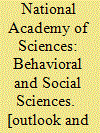

|
|
|
|
|
| Publication |
Englewood Cliffs, Prentice Hall Inc, 1969.
|
| Description |
xv, 320p.
|
|
|
|
|
|
|
|
|
|
|
|
Copies: C:1/I:0,R:0,Q:0
Circulation
| Accession# | Call# | Current Location | Status | Policy | Location |
| 004466 | 300/NAT 004466 | Main | On Shelf | General | |
|
|
|
|
| 9 |
ID:
030864
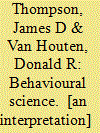

|
|
|
|
|
| Publication |
California, Addison-Wesley Publishing Company, 1970.
|
| Description |
xv, 268p
|
|
|
|
|
|
|
|
|
|
|
|
Copies: C:1/I:0,R:0,Q:0
Circulation
| Accession# | Call# | Current Location | Status | Policy | Location |
| 004486 | 300/THO 004486 | Main | On Shelf | General | |
|
|
|
|
| 10 |
ID:
185256
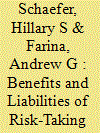

|
|
|
|
|
| Summary/Abstract |
The military environment presents an intersection between a setting featuring unavoidable risk and individual risk-taking propensity; prior work suggests risk-takers have positive and negative outcomes here, and messaging about risk-taking in the military is mixed. The current study used social identity theory to examine how self-reported risk propensity related to three identities/outcomes among cadets at the U.S. Military Academy: attributes of an archetypal “Model Soldier” (physical and military excellence), “Model Student” (grade point average, service positions, and behavior), and Military Values (bravery, duty, and resilience). Structural equation modeling demonstrated that risk-taking was positively related to our Model Soldier and Military Values identities but negatively associated with being a Model Student. Additionally, high-risk-taking cadets were viewed by peers and instructors as confident but prone to judgment, self-discipline, and insight difficulties, suggesting overconfidence among risk-takers. Quantified as a difference between confidence and self-discipline, judgment, and insight, overconfidence mediated the relationship between risk-taking and the three identities, suggesting overconfidence drives both positive and negative associations with risk-taking. Military and leadership implications are presented.
|
|
|
|
|
|
|
|
|
|
|
|
|
|
|
|
| 11 |
ID:
031958
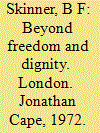

|
|
|
|
|
| Publication |
London, Jonathan Cape, 1972.
|
| Description |
225p.
|
| Standard Number |
0224006681
|
|
|
|
|
|
|
|
|
|
|
|
Copies: C:1/I:1,R:0,Q:0
Circulation
| Accession# | Call# | Current Location | Status | Policy | Location | IssuedTo | DueOn |
| 009664 | 150.1943/SKI 009664 | Main | Issued | General | | RF334 | 16-Feb-2024 |
|
|
|
|
| 12 |
ID:
167822
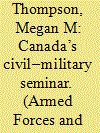

|
|
|
|
|
| Summary/Abstract |
The “civil–military gap” is a significant factor that can hinder the success of complex comprehensive approach missions. Perhaps nowhere is this gap more apparent than in the relationship between military and civilian nongovernmental organizations. Interagency education and training have been suggested as ways to diminish this divide. This research describes one Canadian approach to interagency education: the Civil–Military Seminar. Quantitative and qualitative results demonstrate the promise of both the assessment approach used and the positive outcomes that may help to narrow the civil–military gap.
|
|
|
|
|
|
|
|
|
|
|
|
|
|
|
|
| 13 |
ID:
041344
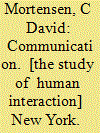

|
|
|
|
|
| Publication |
New York, McGraw - Hill Book Company, 1972.
|
| Description |
x, 430p.
|
| Standard Number |
07043395
|
|
|
|
|
|
|
|
|
|
|
|
Copies: C:1/I:0,R:0,Q:0
Circulation
| Accession# | Call# | Current Location | Status | Policy | Location |
| 010741 | 150/MOR 010741 | Main | On Shelf | General | |
|
|
|
|
| 14 |
ID:
074608
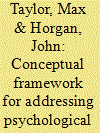

|
|
|
|
|
| Publication |
2006.
|
| Summary/Abstract |
A conceptual framework is presented for addressing psychological issues in the development of the terrorist. In particular, the authors suggest that viewing terrorism as a process may lead not only to better conceptual development in analyses of the terrorist, but may also lead to the development of more practical and efficient counterterrorism initiatives. Additionally, viewing terrorism in this way may finally lead to the formation of a clear and unambiguous position for psychology within an interdisciplinary approach to analyses of both terrorism and the terrorist.
|
|
|
|
|
|
|
|
|
|
|
|
|
|
|
|
| 15 |
ID:
041341
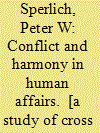

|
|
|
|
|
| Publication |
Chicago, Rand Mc Nally and Company, 1971.
|
| Description |
xii, 256p.
|
| Series |
American politics research series
|
|
|
|
|
|
|
|
|
|
|
|
Copies: C:1/I:0,R:0,Q:0
Circulation
| Accession# | Call# | Current Location | Status | Policy | Location |
| 008740 | 150/SPE 008740 | Main | On Shelf | General | |
|
|
|
|
| 16 |
ID:
186342
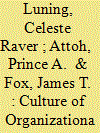

|
|
|
|
|
| Summary/Abstract |
With the backdrop of the utility of grit at the individual level, speculation has begun to circulate that grit may exist as an organizational level phenomenon. To explore this potential construct, this study used an exploratory, qualitative research design. This study explored grit at the organizational level by interviewing leaders’ perceptions of what may be a culture of organizational grit. Participants included 14 U.S. military officers. Seven themes emerged relative to the research question: “What do U.S. military officers perceive as a culture of organizational grit?” Themes included professional pride, team unity, resilience-determination, mission accomplishment, core values, growth mindset, and deliberate practice. This study indicated that a culture of organizational grit is likely a combination of converging organizational elements. Overall, findings indicate that there may be a culture of organizational grit in the military and at the least, more research examining the concept is warranted.
|
|
|
|
|
|
|
|
|
|
|
|
|
|
|
|
| 17 |
ID:
113928
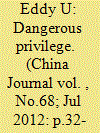

|
|
|
|
|
| Publication |
2012.
|
| Summary/Abstract |
Why did otherwise savvy or cautious intellectuals put themselves at risk by attacking the dictatorial Chinese Communist state during the Rectification Campaign of 1957? This essay highlights the critical impact of the postrevolution institution of the united front. A primary tool for acquiring support of non-Party personnel, the official institution featured at the élite level a bundle of exclusive privilege and cultivated exemplary cooperation as well as sentiments of trust, confidence and even admiration toward the regime. Determined to conduct a successful rectification campaign, the regime targeted the élites as usual for support but with augmented privilege. The particular yet familiar approach greatly affected the psychology and calculus of the élites, prompting some to cooperate in criticizing the state. Their publicized opinions set off the dissent of intellectuals and resulted in their own decline. The analysis furthers understanding of the united front and state-society relations in the early Mao years.
|
|
|
|
|
|
|
|
|
|
|
|
|
|
|
|
| 18 |
ID:
154005
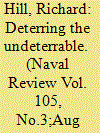

|
|
|
| 19 |
ID:
191909


|
|
|
|
|
| Summary/Abstract |
We examine whether politically irrelevant events can cause conflicts, by analyzing the effects of professional football games in Europe on protests in Africa—an unintended spillover across the continents. By expanding psychological theories, we argue that the outcomes of the football games in Europe can affect African people's subjective evaluation of domestic politicians, which in turn can trigger protests. By exploiting as-if random variation in the results of 15,102 close football games conditional on betting odds, we find that compared to draw games, close losses of African players’ teams increase peaceful protests in their original countries while not changing the likelihood of riots or armed conflicts. The effect is particularly large for non-ethnic protests targeted at a central government. Close losses also temporarily decrease people's trust in their country's leader. By contrast, close victories do not have equivalent or compensating effects on protests or public opinion. These results suggest asymmetric misattribution: people in Africa unreasonably blame domestic politicians for bad luck in European football games, prompting protests; but they do not credit politicians with football victories.
|
|
|
|
|
|
|
|
|
|
|
|
|
|
|
|
| 20 |
ID:
153559
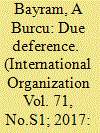

|
|
|
|
|
| Summary/Abstract |
Why are some politicians guided by a sense of obligation toward international law but others are not? Why do some politicians have a social as opposed to an egoistic preference over compliance with international legal rules? Existing approaches largely assume that the structural features of the compliance environment shape preferences. As a result, they neglect the heterogeneity across decision makers' subjective beliefs in the legitimacy of international law, which is critical for explaining who exhibits a sense of obligation and has a non-egoistic preference for compliance. Drawing upon a large body of psychological research on social identity and influence, I argue that obligation toward international law has a behavioral foundation shaped by cosmopolitan social identity. Using data from an original survey of German politicians that includes two compliance experiments, I show that politicians with a high degree of cosmopolitanism are driven by a sense of legal obligation that results in a social preference for compliance while those low on cosmopolitanism lack the same sense of normative respect. Replicated in a second experimental study conducted with a convenience sample, my results indicate that strategic rationality in compliance applies, but only to a particular set of actors. By illuminating the psychological underpinnings of obligation toward international law, this study contributes to a richer understanding of compliance preferences and builds a bridge between instrumental and normative models.
|
|
|
|
|
|
|
|
|
|
|
|
|
|
|
|
|
|
|
|
|